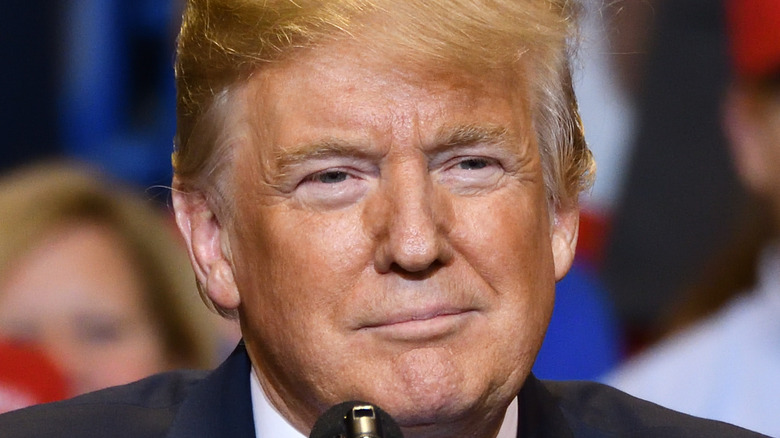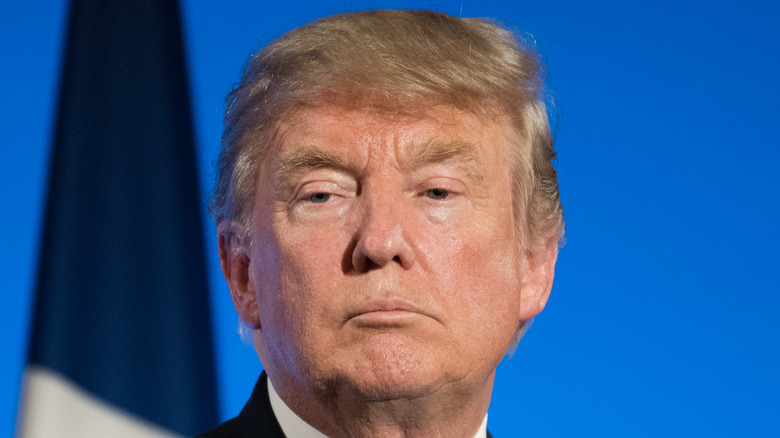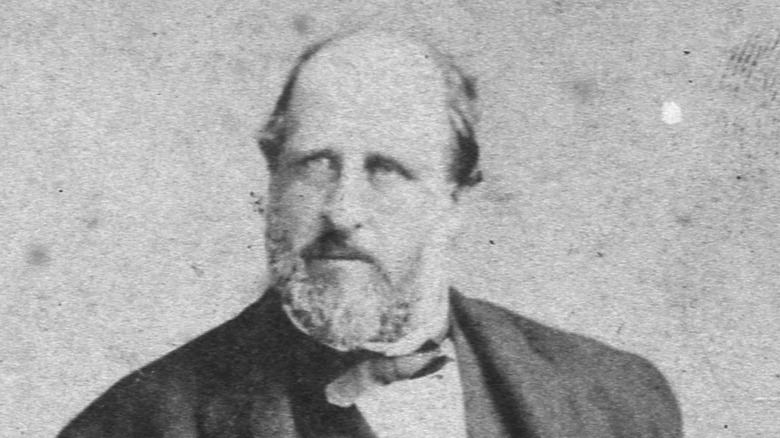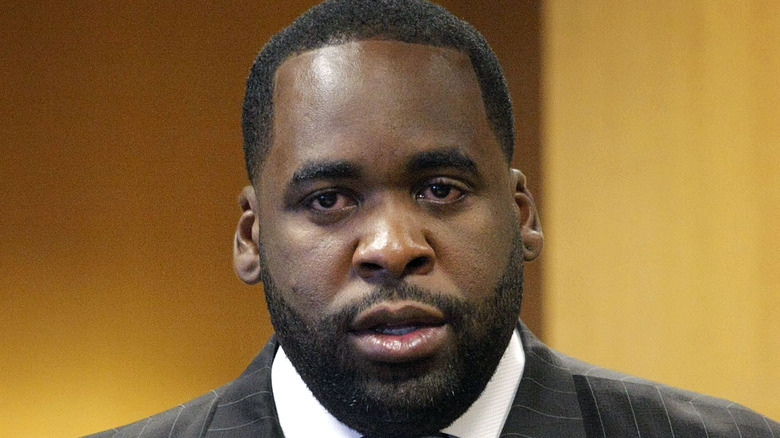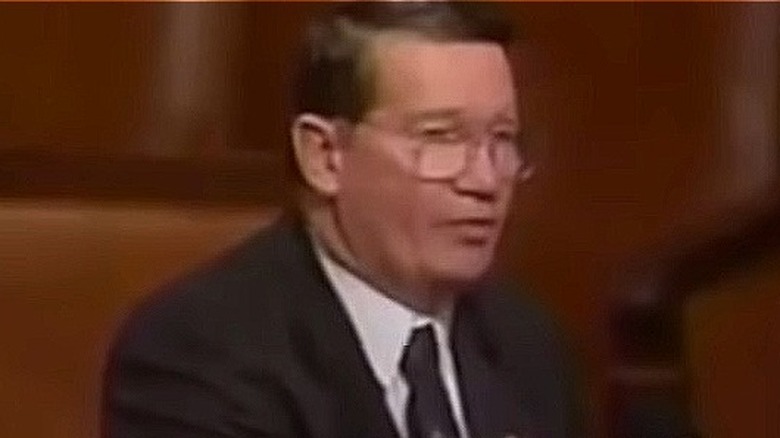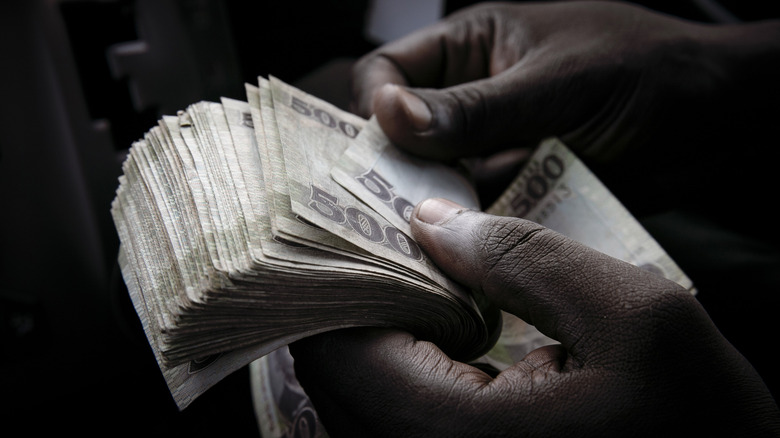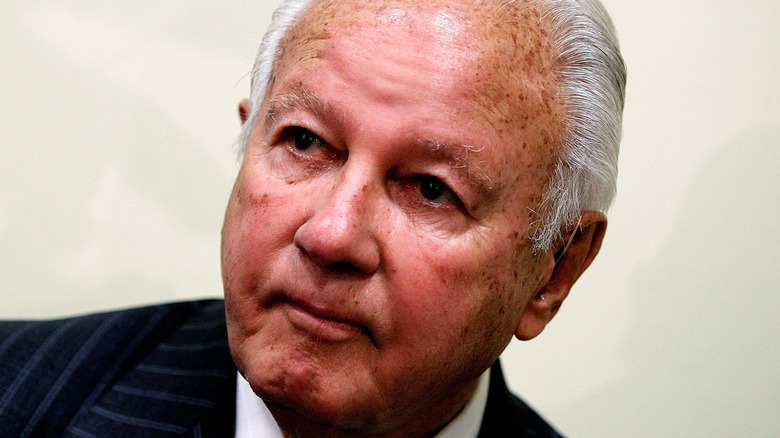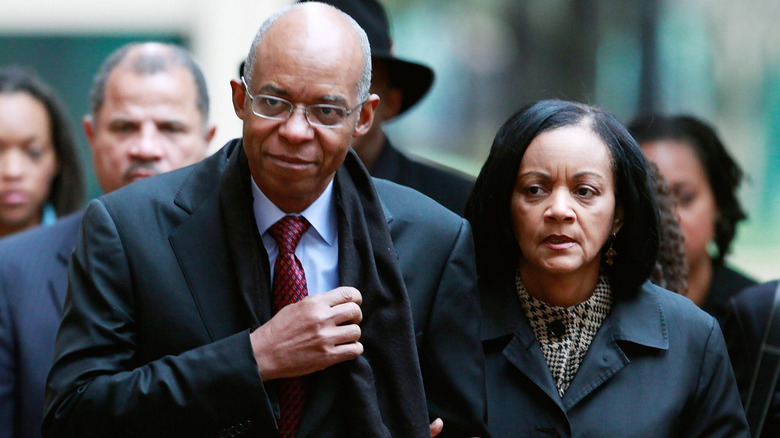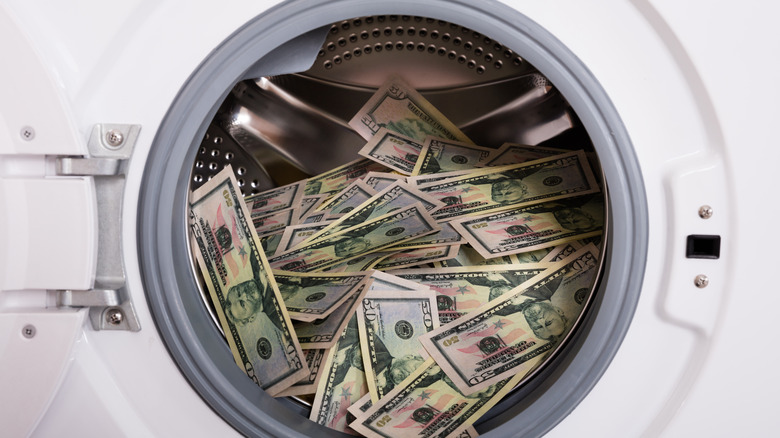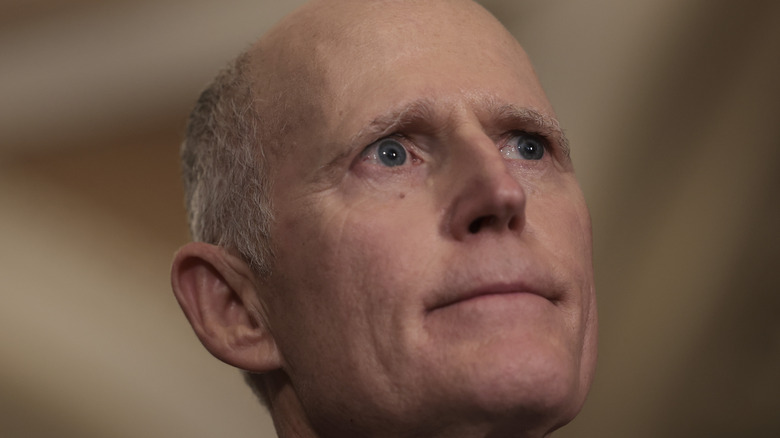Politicians Who Scammed People Out Of Millions
Take a peek at what's trending on streaming services like Netflix, Hulu, and HBO Max, and one thing becomes clear: we're a society obsessed with scams and scam artists. There's the LuLaRoe documentary "LuLaRich" on Amazon Prime, "The Housewife and the Hustler" on Hulu, "The Inventor" on HBO Max — the list could go on and on. Experts, like the ones who talked to HuffPost, say we're obsessed with these stories for a number of reasons, from feeling superior because we didn't fall for the deception to being in awe of the criminal's brazenness.
We tend to think of scammers existing mostly in the business arena, either because their entire business model is a bit of a scam (hello, LuLaRoe) or because they're using their legitimate company to scam others (hello, Tom and Erika Girardi). However, scammers exist in all spheres, even politics. Sometimes, despite the oath they take to abide by the law and serve their constituents, politicians are the worst scammers of them all.
Case in point: the 12 politicians on this list who scammed people -– from constituents to companies to the government itself -– out of millions.
Donald Trump's slippery finances
Over the course of his campaign and brief presidency, Donald Trump has come under fire for his questionable handling of money a number of times. There were the hush-money payments he made to a woman who claimed she had had an affair with the married politician (and the subsequent hush-money payments to his personal lawyer, Michael Cohen, that served as a sort of thank you for keeping the scandal under wraps). There's the fact that he's paid little to no income tax on his multimillion-dollar fortune over the last 15 or so years, and, as The Washington Post reports, the fact that Trump has allowed the Russian mafia to launder money through his various political holdings for years.
So it should come as no surprise that Trump found himself in hot water once again in mid-2020, this time for scamming his supporters. The Washington Post broke the story, writing that Trump's PAC had collected somewhere north of $75 million in the first six months of the year, but that almost none of that money had gone towards the causes it was supposed to be supporting (like ballot recounts in a number of states). Instead, the donations were paying for Trump's travel, staff salaries, and legal fees. There's nothing like telling your most devoted followers they'll be helping to change the course of history only to use their money to line your own pockets instead.
William 'Boss' Tweed died in jail
But Trump's financial wrongdoings have nothing on the scams and corruption committed by William "Boss" Tweed. A member of the U.S. House of Representatives and a New York state senator, Tweed's most powerful role was actually as the head of the Tammany Hall Democratic political machine in NYC. In this position, Tweed was essentially responsible for the entirety of the city's government, and, using that power, stole an estimated $200 million (about $4 billion today, according to the Gotham Gazette) from constituents, businesses, and the city itself.
In one of the first pieces of investigative journalism, The New York Times broke the story in 1871. Over the course of several stories, the paper outlined the various ways Tweed and his gang had committed their scams, from billing the city for $5.6 million in repairs and new courthouse furniture (when real costs were only about $1.1 million) to using city money to improve the neighborhoods in which they'd bought cheap land (essentially driving up the property values). He was arrested for his crimes in 1871 and subsequently died in jail in 1878. In 1905, the next Tammany Hall leader, George W. Plunkett, would sum up his thoughts about his predecessor succinctly, saying, according to the Gotham Gazette, "The politician who steals is worse than a thief. He is a fool."
Kwame M. Kilpatrick scammed Detroit
When Kwame M. Kilpatrick was elected mayor of Detroit, his constituents saw him as the potential savior of their city, which had been struggling financially for some time. Unfortunately, he was the exact opposite. In fact, his scams had such a negative impact on the city he was charged to lead that The New York Times wrote that his actions "helped accelerate Detroit's march toward bankruptcy."
The Detroit Free Press revealed that Kilpatrick charged at least $210,000 worth of personal expenses — ranging from travel to restaurant meals to expensive bottles of champagne — to the city. The embezzlement was just the first in a series of scandals that included an $8.4 million hush money settlement, pocketing $9.6 million as a result of an extortion system, leasing a luxury vehicle for his wife with city money, and, reportedly, throwing a wild party (complete with stripper poles) at the mayor's mansion.
In the end, Kilpatrick was sentenced to 28 years in federal prison, though he only served eight. After his release in 2021, he told Deadline Detroit he intended to pursue a career in ministry and be done with politics.
Randy 'Duke' Cunningham got a presidential pardon
Randy "Duke" Cunningham will likely go down in history as being the most corrupt congressman of all time — a reputation that's especially unfortunate considering Cunningham is a highly decorated Navy pilot and the inspiration behind the film "Top Gun." But, for most people, his $2.4 million theft outweighs his many positive contributions.
It all started in 2005 when Mitchell Wade, a defense contractor, purchased Cunningham's old house for $1.675 million, well above its market value (a few months later, the house sold again for just $975,000). In return, Wade won a host of Pentagon contracts. From there, The San Diego Union-Tribune found that Cunningham jumped head-first into illegal activities, setting up a veritable menu of bribes from which his associates could choose from in exchange for contracts. Aside from cash, Cunningham accepted a Rolls Royce, all-expenses-paid vacations, and rent-free tenure on a yacht (which he -– inexplicably -– filled with lava lamps).
In the end, Cunningham's various scams landed him an eight-year sentence in federal prison. But, in 2021, he was granted a partial pardon by President Trump, which left him on the hook for the $3.6 million he was ordered by a judge to repay.
Charles H. Keating and the Keating Five
Although he's not a politician himself, Charles H. Keating was assisted by five well-known senators — including Alan Cranston, Dennis DeConcini, Donald Riegle, John Glenn, and John McCain — who intervened with regulators at his request. A WWII veteran-turned-successful lawyer and real estate tycoon, Keating is best known for being the face of the savings-and-loan crisis of the '80s and '90s.
According to The New York Times, back in 1984, Keating bought Lincoln Savings & Loan for $51 million, a sum that was double its worth. Then, taking advantage of new state and federal laws, he began making risky investments with his depositors' money, throwing cash at things like real estate ventures, junk bonds, and stocks. All the while, he was skimming off the top, taking more than $35 million over the years. When the Federal Home Loan Bank Board began investigating Lincoln S&L for unreported losses, Keating called on the senators (all of whom he'd supported financially with his stolen money) to urge the board to back off of its investigation.
Finally, in 1989, Lincoln Savings & Loan went bankrupt. It cost taxpayers $3.4 billion to cover the company's losses. Ultimately, Keating spent four-and-a-half years in jail and pled guilty to wire and bankruptcy fraud. His victims, on the other hand, weren't so lucky -– many lost their entire life savings, and upwards of $285 million had vanished thanks to high-risk, uninsured bonds.
Edwin Edwards wasn't exactly remorseful
Perhaps the biggest political personality in the state of Louisiana during the 20th century, Gov. Edwin Edwards had no qualms about funneling cash from his state into his own pocket in order to, as The New York Times put it, pursue "his own pleasures." He first won the top job in the state back in 1972 and was gung-ho about creating real, lasting change, assigning unrepresented minorities to public posts, and re-working the Louisiana constitution.
But it was during his third and fourth terms when things began to sour. He began taking personal trips to Las Vegas with suitcases of unexplained cash, was caught accepting a $10,000 "gift" from a foreign businessman, was charged with selling state jobs to campaign contributors, and sold permits for both state hospital and nursing home construction as well as riverboat casino licenses. It was this final scam that finally spelled out the end for Edwards -– he was convicted on 17 counts of racketeering, extortion, money laundering, mail fraud, and wire fraud for the millions he'd scammed from prospective license holders (like former San Francisco 49ers owner Edward J. DeBartolo Jr.).
In the end, Edwards served eight years of a 10-year sentence but seemed to have no remorse for his crimes, telling attendees at a political rally, "As you know, they sent me to prison for life, but I came back with a wife" (as reported by The New York Times).
William J. Jefferson's frozen assets
Unlike the other political crooks on our list, William J. Jefferson scammed corporations, not constituents, out of millions of dollars. A former congressman from Louisiana, Jefferson spent seven terms in office, becoming the state's first Black congressman since the Reconstruction era. Then, in 2006, it all came crashing down when his pay-to-play scam was revealed.
Here's what the congressman had been up to: Starting in 2000, according to the FBI, Jefferson had been collecting hundreds of millions of dollars from American companies who wanted to branch out into projects in Africa. Using his position as the co-chair of the Africa Trade and Investment Caucus as well as his position on the Congressional Caucus on Nigeria, Jefferson was telling businesses that their under-the-table money would ensure they were quickly granted the approvals necessary to begin these projects. In reality, the money wasn't speeding up the approval process at all. Instead, it was just fattening up Jefferson's family's bank accounts (and lining his freezer, which is where $90,000 in cash was found during an FBI raid).
Originally, Jefferson was sentenced to 13 years in prison for his scams, but a well-timed appeal in 2017 saw seven of the 10 charges against him thrown out and his sentence reduced to time served.
A presidential pardon for Dan Rostenkowski
The old adage "power tends to corrupt, and absolute power corrupts absolutely" (thanks, Lord Acton!) has never been more clear than in the case of Dan Rostenkowski. Elected to his first political office just after graduating from college, Rostenkowski would go on to spend 36 years in the United States Congress, as well as 13 years as the chairman of the powerful Ways and Means Committee. And while he did a lot of good during his time in office, it's all been overshadowed by the millions he stole through his various scams.
When all was said and done, The New York Times reported that Rostenkowski had been charged with trading House post office stamp vouchers for $50,000 in cash (the scam that originally caught the attention of the federal grand jury), misusing office expense accounts to the tune of $40,000 (which was used, in part, to purchase china, crystal, and furniture), and using $70,000 of House funds to purchase personal vehicles. Additionally, Rostenkowski had added 14 individuals, who did little to no official work, to his Congressional payroll.
Rostenkowski wound up accepting a plea deal that sentenced him to only 15 months in jail, two months in a halfway house, and $10,000 in fines. He never apologized for his actions and was pardoned by President Clinton in 2000.
Stephen E. Stockman had fake charities
Scamming constituents, companies, or even the U.S. Government wasn't enough for Stephen E. Stockman, who also added charities to his list of scam victims. A Texas congressman and conservative firebrand, Stockman solicited $1.25 million from charitable foundations on false pretenses, then used his own fake charities, as well as a handful of bank accounts, to launder the money to be used for his own purposes.
The Department of Justice says that Stockman told donors they were giving money to organizations called The Ross Center and Life Without Limits, both of which promised to tackle educational issues by way of building a non-profit educational center called the Freedom House. Instead, the money that was donated was used to fund Stockman's various political campaigns, and, as revealed by The Texas Tribune, to pay for things like hot air balloon rides, a new dishwasher, and kennel bills for his pets.
Unsurprisingly, the general public was outraged by Stockman's scams, and he was tried just as hard in the court of public opinion as he was in the court of law. Ultimately, he was sentenced to 10 years in federal prison and ordered to pay $1 million in restitution. However, Donald Trump commuted his prison sentence, leaving him with just a hefty fine for his thefts.
Michael O'Keefe blamed his crimes on others
During the '70s and '80s, Michael O'Keefe served as the president of the Louisiana state senate. One of the most important politicians in the area, he was known for being tough, wily, ruthless, and for getting the job done. His presence in local politics was so significant that one reporter told U.S. News & World Report, "His downfall was one of the most spectacular, in the sense of how big it was, how powerful he was, and how far he fell."
O'Keefe actually had two brushes with the law. In 1983, he was sentenced to 16 months in prison after being found guilty of cheating his business partners in a real estate deal, to the tune of $900,000. The scandal led to O'Keefe's first departure from the senate, but, following a pardon in 1986, he resumed his leadership role a few short years later. Then, in 1996, O'Keefe found himself facing charges once again, this time for stealing $7.5 million dollars from a medical malpractice insurer, Physicians National, he'd been hired to rescue. The scam left hundreds of doctors around the country without insurance, according to "Insurance Journal."
O'Keefe didn't manage to return to politics this time, as his sentence kept him locked up for 18 years. The fraudster maintained his innocence throughout all his scandals, blaming his multiple convictions on "rotten people" in the justice system, according to CBS News.
Rick Scott's healthcare fraud
Rick Scott is the rare person who found success in politics after his scams were made public. For most people, running the largest health care fraud in our country's history would be a career-ender, but for Scott, it was just the beginning.
In the late '80s, Scott and his business partner started the Columbia Hospital Corporation, a private hospital group in the southern part of the country. In 1998, the group merged with the Hospital Corporation of America, becoming the largest for-profit healthcare company in the United States. It was then, under Scott's direction as CEO, that the scams really began. The South Florida Sun-Sentinel notes that it started with Columbia/HCA giving kickbacks to doctors who referred patients to them. Then it moved on to Columbia/HCA making patients look sicker than they really were so that Medicare would pay out more for treatments. Finally, the company kept two sets of books, which allowed them to steal even more money from Medicare.
In the end, according to Politico, Columbia/HCA was on the hook for $1.7 billion in fines related to the fraud and pled guilty to 14 corporate felonies. Scott himself was never found guilty of a specific crime, but it's almost impossible to imagine that the head of the conglomerate had no idea what was going on in his hospitals. He'd go on to become the governor of Florida, and spent eight years representing the state in the Senate.
Vince Fumo reportedly liked 'other people's money'
One hundred thirty-seven counts. That's how many Vince Fumo, a former state senator in Pennsylvania, was found guilty on, back in 2009. At that time, Fumo had served in the state senate for 30 years, and by all appearances enjoyed his job -– although some said he enjoyed it a little too much. He once wrote in an e-mail "Being a Senator is the next best thing to royalty!," according to ABC News.
It turns out, those skeptics were right. Fumo had been sending Senate staffers to work on his farm in Halifax, essentially stealing state wages. He'd also funneled over $1 million from a charity he'd started, called Citizens Alliance for Better Neighborhoods, to his own pockets, as well as another $1 million from state coffers. This money went toward things like farm equipment, the installation of heated sidewalks outside his mansion, and hiring private detectives to tail his ex-girlfriends. According to ABC News, one ex-girlfriend said that Fumo liked "OPM" (an acronym he'd developed for "other people's money").
All that relying on OPM resulted in a 55-month jail sentence for Fumo. The New York Times wrote that Fumo had told the court he was "deeply, deeply sorry" at his sentencing, and judging by the fact that he's never attempted to return to politics, it might actually be true.

